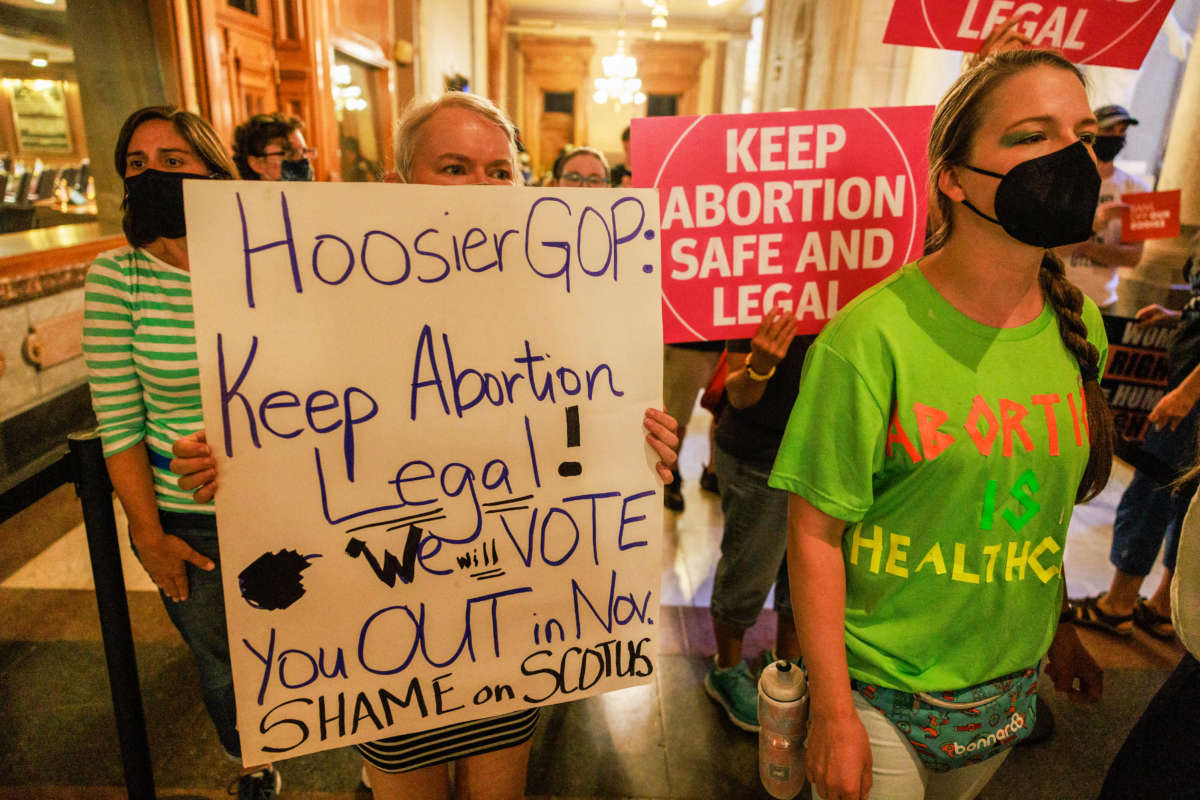Truthout is an indispensable resource for activists, movement leaders and workers everywhere. Please make this work possible with a quick donation.
A new analysis finds that a majority of residents in states where abortion restrictions have been enacted since the Supreme Court overturned Roe v. Wade earlier this year are opposed to the new laws.
A new poll commissioned by The 19th asked residents in states where near-total bans on abortion have recently been enacted whether they support or oppose the bans. Within those states, 52 percent of residents said they believe abortion should be legal in all or most cases, while only 13 percent said they back the bans.
The poll also found that 61 percent of U.S. residents overall believe that abortion should remain legal in all or most cases. Just 10 percent back complete bans and 25 percent believe the procedure should be banned in most cases.
The poll indicates that a majority of voters stand directly opposed to the abortion bans that are being imposed by state lawmakers. According to The 19th’s analysis, the disconnect between voters and state lawmakers can largely be attributed to the fact that white men are overrepresented in government and tend to favor abortion restrictions at higher rates.
“Men, especially White men, have been overrepresented in all levels of the United States government for decades,” the publication’s analysis noted, adding that “the most stringent restrictions on abortion are in states that have the highest Black populations, where the laws are clearly out of line with popular opinion.”
The poll’s findings are backed by the results of referendums on abortion. Where they are able to do so, voters are opposing restrictions on abortion; one notable example is in Kansas, where voters struck down a statewide referendum seeking to quash abortion rights protections recognized by the state’s Supreme Court. Within that referendum, which was held this summer during Kanas’s primary election races, 62 percent of residents voted against a constitutional amendment that would have allowed conservative lawmakers to pass new abortion restrictions.
Several other states across the U.S. are planning to hold similar abortion rights ballot initiatives in the midterm races this November. Polling from those states shows a high likelihood of voters backing the right to abortion.
In Michigan, for example, a poll from September found that 64 percent of voters plan to support an initiative codifying abortion rights in the state Constitution. Earlier this month, a poll found even higher support for a similar proposal in Vermont, with 75 percent saying they plan to support the pro-abortion amendment.
Kentucky also has a question on abortion on its ballot this fall, which, like the Kansas initiative, asks voters to give the state legislature the right to restrict abortion rights. No polling is available yet for that ballot question, according to reporting from Reuters.
A terrifying moment. We appeal for your support.
In the last weeks, we have witnessed an authoritarian assault on communities in Minnesota and across the nation.
The need for truthful, grassroots reporting is urgent at this cataclysmic historical moment. Yet, Trump-aligned billionaires and other allies have taken over many legacy media outlets — the culmination of a decades-long campaign to place control of the narrative into the hands of the political right.
We refuse to let Trump’s blatant propaganda machine go unchecked. Untethered to corporate ownership or advertisers, Truthout remains fearless in our reporting and our determination to use journalism as a tool for justice.
But we need your help just to fund our basic expenses. Over 80 percent of Truthout’s funding comes from small individual donations from our community of readers, and over a third of our total budget is supported by recurring monthly donors.
Truthout’s fundraiser ended last night, and we fell just short of our goal. But your support still matters immensely. Whether you can make a small monthly donation or a larger one-time gift, Truthout only works with your help.
